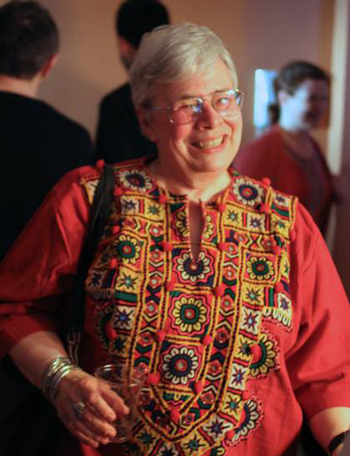Dr. Frances W. Pritchett is Professor Emerita of Modern Indic Languages Department of Middle Eastern, South Asian, and African Studies. In this article, she talks about how she learnt Igbo and her experience with umuigbo that changed her life.
HOW I BECAME AN IGBOPHILE
Back in 1976, I was just another “working girl.” Fate had brought me to Arkansas via New York and Illinois, my children were out of school and on their own. I had finished a term as secretary with the 1968 Arkansas Constitutional Convention, whose delegates crafted a fine document to replace Arkansas’ antiquated Constitution of 1874, only to have it turned down by the voters. I had then settled into a clerical position with an outstanding law firm that represented labor unions in Arkansas and elsewhere.
I was enjoying my work, but feeling the need for some kind of enrichment in my life. I found what I wanted when I joined the Host Family Program at UALR (University of Arkansas in Little Rock). I took a Nigerian student as my “friendship partner” because I was told that it was hard to find families who would accept black students. Over supper at a cafeteria, my student, Richard Chime, told me that his country was in West Africa and contained three large ethnic groups plus many smaller ones. He himself belonged to the Igbo group inhabiting the southeastern part of Nigeria–the same group that had been involved in the Biafran War (1968-70).
Finding the post-war Nigerian educational system unable to accommodate all of them, many Igbo, especially Biafran War veterans eager to make up for lost time, left for other parts of the world. Hundreds of them landed in Arkansas to enroll at Philander Smith College, which actively recruited them.
I was appalled at my ignorance about Nigeria and Africa in general, and shamed by this young man who had traveled thousands of miles from a place that many Americans thought of as one big jungle, or the “dark continent,” yet who spoke my language so well.
I had always been a lover of languages, but had been exposed to only European ones, so when I heard the strange-sounding tongue spoken by Richard and his roommate, I longed to be able to converse with them in their own language.
I told Richard I wanted to learn Igbo, and he recommended someone who would be willing to start me off. I managed to round up some grammar books, and soon I was making headway in a course of study that continues to this day.
In learning about a language one also learns about the culture that produced it–the beliefs, traditions, habits, attitudes, ways of making a living, interpretations of natural surroundings, ideas about marriage, children, etc.
I discovered that my Eurocentric education had left me sadly ignorant about Africa, so I began to educate myself by reading books by African writers. “Things Fall Apart,” by Chinua Achebe, had a great impact on me.
I developed a desire to see for myself this milieu that was clearly so different from my own. Why not, I thought, have the tables turned against me and find out what it was like to be the only face in a sea of black ones–a reverse of the condition that some African-Americans have to face every day of their lives.
I also wanted to practice my new-found language skill in a place where many people knew no English at all. All of this led to three trips to Nigeria (the first one in 1978) and some long-lasting friendships.
A description of my travel experiences would make this story too long. Let me just offer these thoughts. We should never be ashamed (or too proud) of our roots, wherever in the world they lie. We should welcome visitors and immigrants; they need our friendship and help. This country could find a way to accommodate even to accommodate everyone who wants to come here, if we only use our heads and open our hearts.


